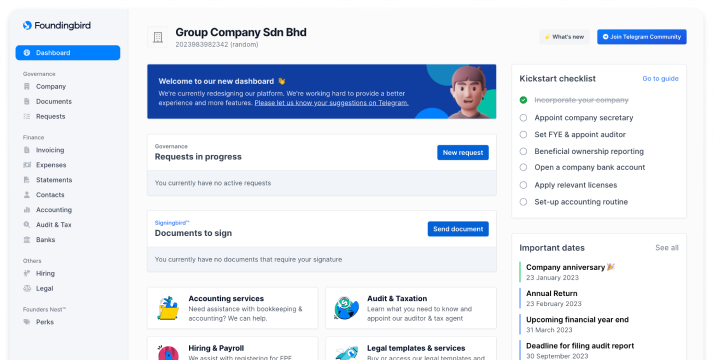The guide to P2P lending for SMEs in Malaysia

As the key driver of economic growth and employment, SMEs contributed more than one third to the GDP and accounted for 66% employment in Malaysia in 2018. Despite the contribution of SMEs towards the country’s economy, 19% of local SMEs have struggled to access funding from traditional financial institutions, as reported by a survey on SME financing conducted by Bank Negara. Over the years, SMEs have turned towards alternative funding channels in order to overcome the financing gap. In 2016, Malaysia became the first country to regulate P2P lending platforms in Southeast Asia to address this issue faced by many SMEs.
What is P2P lending?
Instead of applying for loans from banks, Peer-to-Peer (P2P) lending enables businesses to obtain loans directly from lenders through an online platform in the form of crowdfunding. Each P2P lending platform may offer different types of financing products which businesses can choose from according to their needs such as invoice financing, working capital financing, general business financing, etc. with its own features and conditions.
Eligibility criteria to raise funds on a P2P lending platform
To be qualified to raise funds on P2P lending platforms, businesses need to fulfil the minimum criteria set out by the Securities Commission (SC) as follows:- Has registered with Companies Commission of Malaysia (SSM) or local authority as one of the following business entities - sole proprietorship, partnership, limited liability partnerships, private limited company, or an unlisted public company.
- Can only host 1 funding on a P2P lending platform at a time unless the concurrent funding on another P2P lending platform is for different purposes.
Besides that, P2P lending platforms may require businesses to meet additional criteria such as:
- Minimum shareholding owned by Malaysians
- Minimum paid-up capital
- Minimum months / years of operation
- Minimum annual turnover
How does P2P lending platform work?
Each P2P lending platform may have different registration and application flows. This is a general overview of how they work.
1. Sign up on the P2P lending platform
You are required to provide business information such as nature of your business, contact details, paid-up capital, directors and shareholders information, etc. besides uploading a copy of your IC / passport and official business documents.
2. Decide on the financing product that suits your business
As each business can only host 1 funding at a time on 1 P2P lending platform, it is important to access the financing product that suits your business needs according to the funding purposes, funding amount, repayment period, etc. You will state the funding amount that you want to raise for your business at this step.
3. Wait for verification and approval by the P2P lending platform
A background check will be performed by the P2P lending platform on your business to verify your identity, access the financial viability of the business and go through a credit check. It may take a few days to a few weeks.
4. Accept the offer
The P2P lending platform will come out with terms and conditions together with the interest rate of your funding. Once you have accepted the offer, your funding request will be published on the P2P lending platform and investors can choose whether or not to fund your business.
5. Receive funds
The fund will be credited to your bank account once it has reached the target amount set earlier during the application. Bear in mind that if you managed to raise more than the target amount, you can only get the target amount and the remaining amount will be refunded to investors. However, businesses will need to bear the stamping and origination fees for each successful funding.
Advantages of P2P lending for SMEs
1. Lower interest rate
Compared to banks, P2P lending platforms often offer a lower interest rate due to lower origination fees.
2. Convenient application process
While most of the banks require you to physically visit their branch for a loan application, you can easily apply for P2P funding online. Without the multi-layered bureaucratic process practised in conventional banks, the approval process of P2P lending platforms is quicker as well.
3. High accessibility
Businesses that lack adequate track records or with poor credit rating often face difficulties when applying for a bank loan. P2P lending platforms make funding possible for businesses even without collateral.
4. No prepayment penalty
Traditional banks often impose a penalty if you choose to pay your bank loan off early. On the contrary, businesses who have obtained a loan on P2P lending platforms are encouraged to make early repayment if possible; there is no prepayment penalty on P2P lending platforms.
5. Flexible
As banks have their rigid business models to follow, it can be difficult for businesses to get a loan below minimum loan limit. Through P2P lending platforms, businesses can get their target amount approved as smaller funding needs can be met within short period of time from multiple lenders.
Disadvantages of P2P lending for SMEs
1. Possible unsuccessful funding
Even if the application on a P2P lending platform gets approved, it does not guarantee the success of the funding. At least 80% of the target amount needs to be met within the funding period or else it is considered a failure and has to be done all over again.
2. Privacy exposure
To facilitate lenders in making funding decisions, most P2P lending platforms require public disclosure of your financial history, business plan and other relevant information. Hence, pitching to many lenders means losing some anonymity of the business.
P2P lending platforms in Malaysia
All P2P lending platforms operating in Malaysia should be approved by SC as registered recognised market operators. As of May 2020, there are 11 approved P2P lending platforms. The market share data in this article was taken from Malaysia’s P2P lending platform performance review done by Fintechnews.my.
1. Funding Societies
Date approved: November 2016Operator: Modalku Ventures Sdn Bhd
Funding Societies is a Southeast Asia based digital financing platform, operating in Singapore, Indonesia and Malaysia. As of January 2018, Funding Societies is the biggest market player in Malaysia, having 51% market share in the P2P lending industry.
2. B2B Finpal
Date approved: November 2016Operator: B2B Finpal Sdn Bhd
B2B Finpal is a Malaysia P2P lending platform with in-house risk management technology and partnership with trusted Credit Bureau. As of January 2018, it is the second largest player in the local P2P lending industry, holding approximately 25% market share.
3. Fundaztic
Date approved: November 2016Operator: Peoplender Sdn Bhd
Fundaztic has a strong management team that consists of industry veterans and senior level ex-bankers, bringing a 50-year combined expertise in finance, legal and technology. As of January 2018, Fundaztic owned 13% of the market, securing third place in the local P2P lending industry.
4. QuicKash
Date approved: November 2016 **Operator: QuicKash Malaysia Sdn Bhd
QuicKash is a unit under the ManagePay Systems Berhad, an e-payment solution provider, leveraging on the MPAY’s fintech technology. As of January 2018, QuicKash is the fourth biggest market player in the P2P lending industry of Malaysia with 8% market share.
5. AlixCo
Date approved: November 2016Operator: FBM Crowdtech Sdn Bhd
AlixCo is operated by FBM Crowdtech, the only Registered Market Operator in Malaysia that operates both P2P lending and equity crowdfunding platforms. AlixCo holds 2% of the Malaysian market share in the P2P lending industry as of January 2018.
6. Nusa Kapital
Date approved: November 2016 **Operator: Ethis Kapital Sdn Bhd
Nusa Kapital is the world’s first regulated Shariah-compliant P2P lending platform based in Malaysia advised by International Shariah Research Academy for Islamic Finance. As of January 2018, it holds 1% market share of the P2P lending industry of the country.
7. CapBay
Date approved: May 2019Operator: Bay Smart Capital Ventures Sdn Bhd
CapBay is founded by Ang Xin Xian, Edwind Tan and Darrel Ang, who are all alumni of Oxford University, as well as Dion Tan, a London School of Economics graduate. As an award-winning platform, CapBay offers both P2P lending and supply chain finance technology solutions.
8. CapSphere
Date approved: May 2019Operator: Capsphere Services Sdn Bhd
CapSphere is the first asset-based P2P lending platform in Malaysia. This asset-based financing model enables the financing cost to be more accessible to borrowers while provides investors with greater assurance and security on their investment.
9. MicroLEAP
Date approved: May 2019Operator: MicroLEAP PLT
MicroLEAP is a FinTech platform that focuses on the microfinance sector. From the platform, borrowers are able to raise as little as RM1,000, via either Shariah-compliant or Conventional financing.
10. Crowd Sense
Date approved: May 2019Operator: Crowd Sense Sdn Bhd
As of May 2020, Crowd Sense has yet to go live.
11. Money Save
Date approved: May 2019Operator: Money Save (M) Sdn Bhd
As of May 2020, Money Save has yet to go live.
How to choose a suitable P2P lending platform?
Even though P2P lending platforms work in a similar way in general, just like banks, there are several things to consider when it comes to choosing a suitable one for your business.
1. Types of financing product offered
Whether it is invoicing financing or working capital financing, terms and conditions applied may vary from one P2P lending platform to another. It is important to understand the criteria of each product before deciding on one that suits your business needs.
2. Financing amount
Even though there is no target amount limit imposed by the SC, each P2P lending platform may have a minimum and maximum amount of funds that can be raised on their platforms.
3. Costs of finance
Other than the interest payments, businesses will be charged additional fees for successful funding on P2P lending platforms, such as processing fee, platform fee, stamping fee, guarantee fee, etc.
4. Published statistics
While this information may not be available for all market players, certain P2P lending platforms do publish updated statistics on their funding success rate, fulfilment days, and total funding crowdfunded. These might be a good reference point to give you a rough idea about the success rate of your funding.
Alternative funding like P2P lending has become a necessary part of the financial ecosystem in Malaysia with a funding approval rate of over 70% for local SMEs. As of March 2020, a total of RM738.99 million has been raised for 2,100 businesses since 2016 when P2P lending platforms were first started operating in Malaysia. Hence, it is good to take P2P lending into consideration when it comes to raising funds for your business.
Table of Contents
We're the most convenient online platform for starting & managing a Sdn Bhd
- Incorporation of Sdn Bhd
- Company secretary
- Accounting & Bookkeeping
- Audit & Taxation
- HR & Payroll



